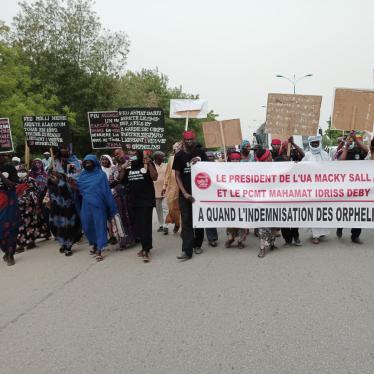(Lisbon)- European and African leaders should go beyond promises and act to end atrocities, hold abusers to account and combat corruption, Human Rights Watch said today. The first European Union-Africa summit for seven years will be held in Lisbon on December 8-9, 2007.
The summit is meant to forge a new EU-Africa partnership with enhanced links, and is set to approve a detailed action plan, listing priorities and outcomes in a range of areas from security to human rights to trade. Human Rights Watch called on the leaders to commit to specific actions translating these principles into reality by protecting the civilians of Darfur and Somalia, bringing to justice the former dictator of Chad, Hissène Habré, and implementing anti-corruption measures.
“The summit will make a lot of noble promises, but the proof of the pudding is in the tasting,” said Reed Brody, counsel for Human Rights Watch. “Will the summit make a difference to the civilian under bombardment in Somalia, to the democracy activist in Zimbabwe, or to the Senegalese youth on a rickety boat bound for Spain?”
The summit action plan prioritizes “enhancing the capacity of Africa and the EU to respond timely and adequately to security threats.” Human Rights Watch said that the wars in Darfur and Somalia would put this priority to the test. Deployment of the United Nations/African Union “hybrid” peacekeeping mission for Darfur has been painfully slow, Human Rights Watch said, while the protection mandate of the African Union mission in Somalia (AMISOM) remains unclear in the face of the indiscriminate and deliberate bombardment of civilian neighborhoods by Ethiopian troops.
“Darfur is an immediate test for the leaders of Europe and Africa,” said Brody. “Will they pledge joint action to protect civilians, yet still let the people of Darfur die?”
The proposed Strategic Partnership agreement says that “crimes against humanity, war crimes and genocide should not go unpunished and their prosecution should be ensured.” The case of Habré, the exiled former Chadian dictator accused of crimes against humanity, provides an opportunity for African Union (AU)-EU cooperation on this issue, Human Rights Watch said. The AU mandated that Senegal prosecute Habré “on behalf of Africa” and President Abdoulaye Wade of Senegal has requested EU and AU technical and financial support carrying out such a trial. The EU has in principle agreed to this request, and the AU has named an envoy to the case.
Human Rights Watch said the AU and EU should also do more to pressure Sudan to cooperate with the International Criminal Court and hand over two of its officials indicted for war crimes and crimes against humanity in Darfur.
The action plan seeks “enhanced cooperation in the fight against corruption.” Human Rights Watch called on African countries to publish transparent national budgets and create independent agencies to prosecute corrupt officials, and asked the EU to make it an offense for EU firms to engage in corrupt activities abroad and to prevent banks from sheltering the ill-gotten gains of corrupt officials.
Human Rights Watch said that the political repression in Zimbabwe was a test of African political will and leadership in tackling human rights violations and issues of bad governance.
“African governments don’t like it when Europeans protest the treatment of the people of Zimbabwe,” said Brody. “But as the repression drags on year after year, African governments, led by South Africa, have failed to secure concrete action from Zimbabwe on human rights.”
The action plan objective is “coordinated positions on global issues in international fora such as the UN Human Rights Council.” This would be a dramatic development, as discussions at the council have tended to be polarized along regional lines. European and African states should come together immediately around issues of common concern, such as the extension of the mandate of the human rights rapporteur on Sudan, follow-up to the rapporteur on Myanmar’s recent visit, and invigorating the new process of universal periodic review.







